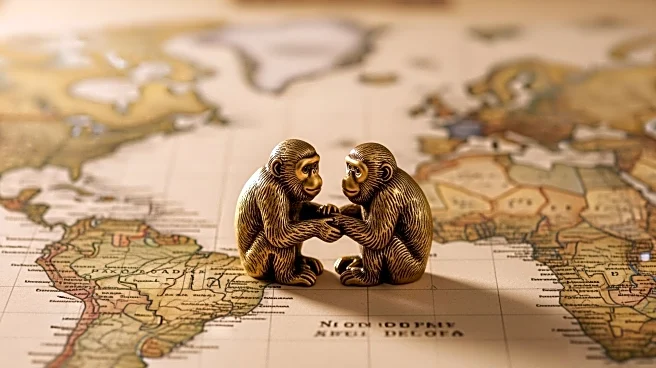What's Happening?
China has introduced its rare golden snub-nosed monkeys to European zoos as part of a diplomatic initiative similar to its well-known 'panda diplomacy.' These endangered monkeys, characterized by their
distinctive orange manes and blue faces, have been sent on a 10-year loan to zoos in France and Belgium. The initiative marks the 60th anniversary of diplomatic relations between China and France. The monkeys are expected to serve as ambassadors for scientific and conservation collaboration, while also raising concerns about the welfare of animals transported for diplomatic purposes.
Why It's Important?
The introduction of golden snub-nosed monkeys to Europe highlights China's use of wildlife as a tool for soft diplomacy, aiming to strengthen international relations and promote cultural exchange. This move could enhance scientific collaboration between China and European countries, focusing on conservation efforts for endangered species. However, it also raises ethical questions about the impact of long-distance animal transport on individual welfare. The initiative reflects China's broader strategy of using wildlife to foster goodwill and cooperation on the global stage.
What's Next?
The zoos involved in this initiative plan to engage in joint research and conservation programs with Chinese authorities, similar to existing collaborations for pandas. These efforts aim to enhance understanding of the species and contribute to their conservation. As the monkeys adapt to their new environments, ongoing monitoring will be essential to ensure their well-being. The success of this initiative could pave the way for similar diplomatic exchanges involving other endangered species, furthering international cooperation in wildlife conservation.
Beyond the Headlines
The use of animals in diplomacy raises important ethical considerations regarding their welfare and the potential stress caused by relocation. While such initiatives can promote conservation and cultural exchange, they must balance these goals with the responsibility to ensure the health and well-being of the animals involved. This situation underscores the need for transparent and ethical practices in wildlife diplomacy, ensuring that conservation efforts do not come at the expense of individual animal welfare.











